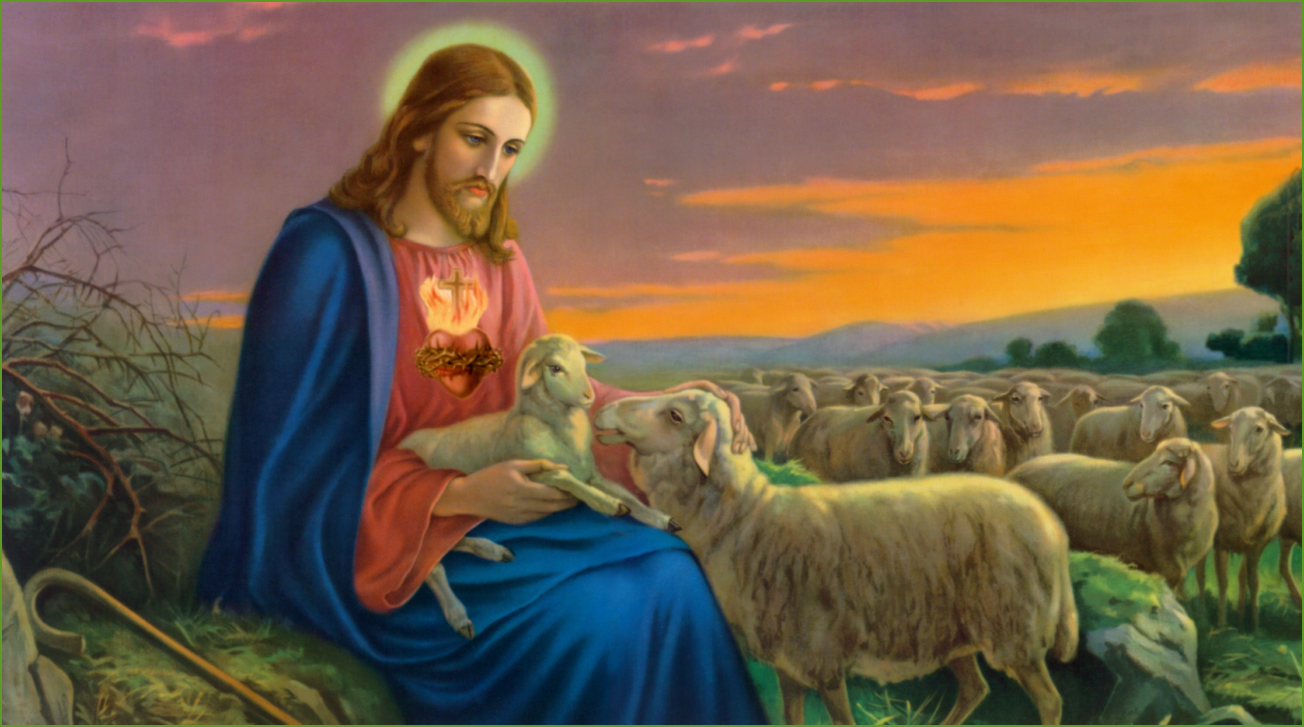
 The Beauty and Truth of the Catholic Church Vol. IV B. Herder, St. Louis, MO, 1816 Fr. Edward Jones With Imprimatur and Nihil Obstat, 1916 Sermon VI: The Providence of God for Body and Soul
"Seek ye therefore first the kingdom of God, and His justice,"-----namely, that which is most important-----"and all these things shall be added unto you" [Matt. 6, 33]. The multitudes followed the Savior up the mountain to hear His teachings, and forgot all about providing themselves with the necessary food. Hence Our Divine Savior said to the Apostle Philip: "Whence shall we buy bread, that these may eat?" [John 6, 5]. Our Divine Savior addressed this question to Philip not because He was anyway embarrassed by the apparent necessity of providing food for so large an assembly, "for He Himself knew what He would do," but in order to try the faith of the Apostles. He wished by His tender Providence which animated Him to nourish the multitude with material food, and thus also give an answer to the oft repeated question: "Whence shall we buy bread?" There is nothing that we forget so easily as the Providence of God, and yet without this Divine Providence our every effort will be barren of result. Nothing would prosper, for everything depends on the blessing of God. "Whence shall we obtain bread?" is a question that we hear fall from the lips of many Christians. "Where shall we find the means to nourish the life of the soul, and to preserve it in the grace of God?" God has provided even more wonderfully for the sustenance of the soul, so that she will not go down to miserable ruin in the wilderness of this life. But here too we are prone to forget the Providence of God for our souls. This twofold forgetfulness brings forth a complete reversal of the natural order of things, and the results from this condition of affairs can be none other than wrong. It is therefore my purpose to speak to you today about the Providence of God for the body and the soul, for the temporal and the eternal life, so that in the one case we will place our trust in God, and in the other use it for the benefit of our eternal salvation. Above all things, however, we should not forget the words of the Savior: "Seek ye therefore first the kingdom of God, and his justice, and all these things shall be added unto you." O Jesus, assist us with Thy grace! 1. What is the Providence of God? It is the coordinating of all those means given by God to creatures and to men, so that they can attain their end and fulfill the tasks, for which God created them. The ultimate end of creatures is the glory of God and the service of man. The ultimate end of man is first and foremost his eternal happiness. For God has created man that he may know Him, love Him and be eternally happy with Him in Heaven. For this reason God places at his disposal all the means that will enable him to fulfill his vocation here on earth, and obtain eternal happiness in Heaven. And verily, nothing escapes the omniscience of God. He knows all the means that are necessary and apt to lead man to his destiny; He knows all the obstacles that confront us, and the means that are best calculated to remove such obstacles. His wisdom knows how to arrange all things in such a way that everything will eventually turn out for the best. Nothing can resist His omnipotence, and His mercy refuses nothing. Such is the Providence that watches over us, and hence there will be wanting to us nothing that our temporal and eternal welfare may demand. For this reason the Apostle St. Peter tells us: "Casting all your care upon Him, for He hath care of you" [1 Peter 5, 7]. This truth will become evident when we consider all the services that Providence renders to man. It is our mother, for from it we have received our existence. God himself tells us by the lips of the Prophet Isaias [46, 3]: "Hearken unto me, O house of Jacob, all the remnant of the house of Israel, who are carried by My bowels, are borne up by My womb." The Providence of God is like the nurse that nourishes and raises us, and carries us in her arms. "And I was like a foster father to Ephraim, I carried them in My arms" [Osee 11, 3]. It is our guard and our guide, for it watches over the whole course of our life: " But thy providence, O Father, governeth it" [Wisdom 14, 3]. It is our teacher and our counselor, for it instructs and advises us when we are in doubt, and when we must act it guides us that we may not err: "I am the Lord thy God that teach thee profitable things, that govern thee in the way that thou walkest" [Isaias 48, 17]. It is our protector and defender in all troubles and dangers, for it assists us everywhere: "Our God is our refuge and strength: a helper in troubles" [Ps. 45, 2]. The Providence of God is our consolation in all anxiety and sadness, for it provides comfort for everyone: "And I will turn their mourning into joy, and will comfort them, and make them joyful after their sorrow" [Jerem. 31, 13]. All the services of mercy, of sympathy, of love that we can imagine, we can find all of them in the Providence of God. It takes the place of father, of friend, of physician, of judge, of shepherd and of every person that can render us any service for the best of our interests. For this reason the Providence of God is the source of all the benefits for body and soul, for time and eternity, that we have so far obtained and still hope to obtain. St. Dorotheus tells us: [Serm. 13] "Wheresoever Providence is, there is also all good, and everything happens for the good of the soul." It exists for others only, retains nothing for itself; it embraces all creatures and excepts none. "For he made the little and the great, and he hath equally care of all" [Wisdom 6, 8]. Hence! there is neither chance nor luck for the Providence of God. We have every reason, indeed, to entrust ourselves to the Providence of God, for in it we find everything that our temporal and eternal welfare may demand. The man who builds thereon has built on a solid foundation. But in order that we may understand this all the better, let us consider Providence in its various manifestations and works. 2. Behold how God created the world in six days, the blue firmament, the clouds in the air, how He separated the water from the earth so that the latter might become dry and bear trees, herbs and fruits. After He had made the sun to shine by day, the moon by night, after He had placed the fish in the water, the birds in the air and the animals upon the earth, then, and only then, when everything needed was at hand, when everything was arranged and made habitable like a house, God created man, gave him the house and constituted him the lord and master over the other creatures. How splendidly the Providence of God for man manifests itself! And should it now cease to care for us? Nay, for Jesus says: "Therefore I say to you, be not solicitous for your life, what you shall eat, nor for your body, what you shall put on" [Matt. 6, 25]. Why does Our Divine Savior forbid every excessive worry about food and clothing, a worry and anxiety that prevents us from raising our eyes to God, and from caring for our souls and for the betterment of our lives? "But your Father knoweth that you have need of these things" [Luke 12, 30]. But in order to strengthen us all the more in this view of the question Our Divine Savior asks His Apostles: "Is not the life more than the meat and the body more than the raiment?" [Matt. 6, 25]. If, therefore, God has given us body and soul, is He not obliged also to give us the means of preserving them? He who gives the greater includes therein also the lesser. How beautiful are therefore these simple words: "Behold the birds of the air, for they neither sow, nor do they reap, nor gather into barns: and your heavenly Father feedeth them. Are you not of much more value than they?" [Matt. 6, 26]. These words assuredly glorify the wonderful Providence of God that is mindful even of the least of His birds. Even the most insignificant of animals live on the Providence of God: "The eyes of all hope in thee, O Lord: and thou givest them meat in due season. Thou openest thy hand, and fillest with blessing every living creature" [Ps. 144, 15, 16]. After all this is, it conceivable that we should have no confidence in the Providence of God, or that He should not be mindful of us also? If God does not forget the least of His creatures, the animals, will He forget man? It is unthinkable! Hence He provides in a multitude of ways for his sustenance. To one He gives health, to another strength; He blesses the endeavors of another and for still another He raises up a benefactor, and thus, in one way or another, He provides for all. In fact, consider the matter a little more closely. Man could not live without the fruits of the earth; but on the other hand the earth would be in no condition to bring them forth did not the seasons return in their regular order. And even this is not sufficient; to all must be added rain and sunshine, and only then is growth and maturity assured when these are given in due time and proportion. And yet how seldom do we find that rain and warmth come as regularly as they should; sometimes storms, then rains, then cold prevail. We often think that everything had conspired to destroy every vestige of the crops. But can anyone remember that the crops have ever suffered to such an extent that they failed to supply at least the most pressing wants and that the shortage so caused was not more than compensated by the surplus that had gone before or that succeeded? How does it come that bad weather has never yet completely destroyed them everywhere? It is indeed by the Providence of God that watches over the good and the evil, that makes the sun shine upon them and that sends rain down upon their fields: it is the Providence of God that men do not recognize and that they seldom thank, but which nevertheless lovingly-----and mercifully bestows its blessings upon them. How admirable is the Providence of God! It has given, as it were, to every animal its appropriate clothing, its skin, its hair, its wool, its fur or its feathers. It does not even forget the plants: "Consider the lilies of the field, how they grow: they labor not, neither do they spin. But I say to you, that not even Solomon in all his glory was arrayed as one of these. And if the grass of the field, which is today, and tomorrow is cast into the oven, God doth so clothe: how much more you, O ye of little faith?" [Matt. 6, 27-30]. 3. Now I can well understand the words of Our Divine Savior: "Seek ye therefore first the kingdom of God, and His justice, and all these things shall be added unto you" [Matt. 6, 33]. If the Providence of God cares for all men and watches over them, how much more will it not do so over all those whose every effort is directed toward one object, namely, to be good Christians, to love God and to work for the salvation of their souls, so that they can become eternally happy in Heaven. Do you not think that God will provide specially for them in the matter of what is most necessary to them for their temporal lives -----though not for what is superfluous? Assuredly! This is so true that we learn to understand the Providence of God in its real and loving greatness only when it is being exercised in behalf of His elect, for then when all ordinary means are lacking, it will have recourse to the most extraordinary ones. God lets manna rain from Heaven for the Jewish people in the desert, He lets water spring from the rock, yea, in spite of their many and prolonged wanderings, neither their clothes nor shoes were tom. God commanded a raven to bring, morning and evening, meat and bread to the Prophet Elias, and at the word of God an Angel sustained Daniel in the lions' den. Our Divine Lord fed four thousand men with seven loaves and a few fishes. How many countless Christians, who seek neither themselves nor the wealth of the earth, but whose purpose in life is to love God and to save their souls, can speak of the special Providence of God in their behalf. But enough of this, for the care that the Providence of God has for the necessities of men is most wonderful. If all men would only recognize this fact, there would be less misery on earth, and calm and peace would return to many hearts that are now torn with care and anxiety. But, some one will ask, if Providence is really so loving and so kind, whence come the many evils of the body and the soul? I answer: Our Heavenly Father knows all this, and all these evils are included in His Providence, all the miseries, all the sicknesses, all the persecutions, all that man may suffer in body and soul. God so directs all these evils for which we ourselves are not responsible, that they will turn out for the best of His elect. The Scripture tells us that God makes all things turn out for the best of those who love Him, and even the evils of life are made to serve a useful purpose. If God even cares for the life of a sparrow and will not allow a single one of these to perish without His knowledge and His permission, how much greater care will He not bestow on men, especially upon those who are His children? "Fear not therefore: better are you than many sparrows" [Matt. 10, 31]. God who has counted the hairs of our head, so that not one shall be lost without His knowledge and permission, looks out even more carefully for the temporal welfare, for the life and the honor of His Christians, so that we may rest assured that we shall suffer nothing without His knowledge or His permission. And yet God permits us to be persecuted or injured by bad men on account of the good that He will know how to draw therefrom either for us or for others. And this good is invariably our eternal salvation and the means to obtain it the more easily and the more surely. Those who have to suffer are driven forcibly to God and to their salvation; but if we have all things that our heart may desire, then we are in danger of losing God and our own souls, and this God always strives to prevent. Joseph says to his brethren [Gen. 50, 20]: "You thought evil against me: but God turned it into good." How many kinds of temporal evils there are; and God should know nothing of all these? He turns them all to the best of those who love Him. Sufferings are the school
to which God sends men so that they may adorn themselves with patience,
with confidence, with virtues of every kind, for he who is obliged to
suffer
will surely not go astray, will commit no grievous sin, but will direct
his gaze upon God God is the Lord of all things and the Master in all things. It is therefore our duty to submit ourselves freely and in a Christian manner to the decrees of His Providence, for His Will will be accomplished whether we will it or not. What did Pharaoh win by his obstinacy? Did he prevent the liberation of the Israelites from the bondage of Egypt? Far from it, and he himself perished. What benefit did the Jews derive from their opposition to the Redeemer? Did they possibly prevent the redemption of the world? Assuredly not, but instead Jerusalem was destroyed and the Jewish people dispersed. What advantage accrued to the pagan emperors from their persecution of the Christians? Did they perchance prevent the propagation of the Catholic Church over the earth? Far from it, but their own mighty empire crumbled into dust. And so will it happen to everyone who will ever try to oppose the decrees of Divine Providence. They alone will suffer harm, but Providence will rule quietly on. There are few people in our day who still believe in Divine Providence which constantly cares for us and watches over our eternal and temporal welfare. The majority of men live as though they themselves were their own providence and the providence of others. In higher circles they reckon on the development of industry, on the progress of so-called civilization or on the power of the State, and assume the attitude that the world and earthly affairs can be ruled without the help of God. In the lower classes the workman depends upon his strength, the tradesman on his skill, the father of the family on his industry and the merchant on his business acumen. This explains the prevalent pagan unrest with regard to the things of the future. "What shall we eat: or what shall we drink, or wherewith shall we be clothed?" [Matt. 6, 31]. This pagan unrest, in its turn, is the reason why the Lord's day is desecrated, why so many miss Mass, why prayer is omitted and why the whole question of the salvation of the soul is neglected. And in spite of all this, pagan unrest, poverty and misery, want and bitter privation are growing apace and drive thousands of men into the most horrible despair. What did it profit them that they assumed the position of providence, or what did they accomplish? Nothing, absolutely nothing, except that the Providence of God has deserted them and left them to their own helplessness. They rebelled against the Providence of God. Our age can show countless numbers of such rebels, and their misery and unhappiness is as great for time as for eternity. 5. We have thus far seen
how lovingly and kindly the Providence of God cares for the welfare of
the body and soul. It is, as it were, the mother, the nurse, the guide,
the teacher and the protector of mankind. And yet this is but the
smallest
part of what Providence has done and still does for men. It shows
itself
most marvelous in its solicitude for the eternal salvation of our
souls.
We would be obliged to go too far afield did we wish to penetrate into
the fathomless depths of Divine Providence. But tell me, who gave us
prayer
with the promise: "Ask, and it shall be given you: seek and you shall
find:
knock, and it shall be opened to you?" [Matt. 7, 7]. It is God Who, in
His tender love for us wished to provide us with a means that should
bring
us help, grace or safety both for body and soul in all the vicissitudes
of life. 6. An old proverb says: "The man who trusts in God has not built on sand." If only men would understand this better, they would assuredly not become disloyal to Divine Providence, Which means it so well with them and does so much for them. And yet we find so many who, instead of resting in the arms of Divine Providence, rely upon their own strength. They live on without prayer, without God, and therefore they so often encounter only bitter disappointment. Would that I could make each of you feel in
your inner most hearts all that God in His loving Providence has been
to
you, is and shall always be. We owe it to the Providence of God, who
knew
us and wanted us from all eternity, that we exist, that by Baptism we
have
been received into the number of His children and heirs, while millions
of others are de- proved of this happiness. We owe our life, our
health,
our all to Providence; we owe it to Providence if we are not suddenly
taken
away in our sins and plunged into the depths of Hell. We shall always
have
to thank God's Providence if we are in the end
really saved. And truly, if we serve God
faithfully., and love Him with all our heart, what greater consolation
can we have than that we are resting in the arms of Divine Providence?
No matter what untoward things may come to us, the thought that God,
our
Heavenly Father knows all about it and will know how to arrange all
things
for the best will give us peace and resignation. He is faithful; He
will
pe mit no one to be tempted beyond his strength, and after all the
struggles
of this life He will give us Heaven as our reward. Therefore I say with
the Apostle St. Peter: "Casting all your care upon him, for he hath
care
of you" [1 Pet. 5, 7]. Amen.
|
 Not
content with this glorious means Divine Providence has placed an Angel
guardian at our side. He is destined to be our protector and defender
against
all the assaults of Satan, our friend and companion on all our ways and
our counselor in doubt. Holy Writ tells us: "For He hath given His
Angels
charge over thee; to keep thee in all thy ways" [Ps. 90, 11]. What was
it, that moved Jesus Christ to come down from Heaven and to die upon
the
Cross? It was Divine Providence that knew of this greatest of all means
and used it to lead men back again to their last end, namely, eternal
salvation.
It was the Providence of God that instituted the Catholic Church
through
Our Divine Savior, so that His teachings, His merits and everything
that
He accomplished for the good of mankind might be preserved to the end
of
time, and that all men might be able to share in the benefits of the
Redemption.
Divine Providence shows itself immeasurably great in the institution of
the Church for the salvation of man. But how would the institution of
the
Church benefit the individual if it were not amply provided with all
kinds
of means like a well furnished dwelling? I will say nothing of the
assistance
of the Holy Ghost and of His grace. But how can you hope to be saved
once
you have estranged yourself from Christ and His Commandments? How can
you
expect to persevere in grace and where will you find the means
necessary
to withstand the many temptations of the world? But be hold, Divine
Providence
has cared also for this by instituting for us the holy Sacraments. From
them, whosoever wishes to drink, may draw the waters of salvation, of
grace
and strength, of pardon and peace. Divine Providence shows itself in
all
its magnificence in the Most Blessed Sacrament of the Altar. Herein we
find all that the soul can desire for its salvation: meat and drink,
the
pledge of eternal life, a friend, physician, counselor and redeemer.
Tell
me now, is Divine Providence not most wonderful in its solicitude for
men?
Hence St. Paul does not exaggerate when he writes: "He that spared not
even His Own Son, but delivered Him up for us all, how hath He not
also,
with Him, given us all things?" [Rom. 8, 32]. No temporal evil, no
temptation,
no calumny or sickness can come over us without the knowledge or the
permission
of God, or that it be not turned to our greatest good. But our greatest
good is the salvation of our souls, and God directs all things towards
this. For what would it profit a man if he gained the whole world, but
in the gaining of it lost his immortal soul?
Not
content with this glorious means Divine Providence has placed an Angel
guardian at our side. He is destined to be our protector and defender
against
all the assaults of Satan, our friend and companion on all our ways and
our counselor in doubt. Holy Writ tells us: "For He hath given His
Angels
charge over thee; to keep thee in all thy ways" [Ps. 90, 11]. What was
it, that moved Jesus Christ to come down from Heaven and to die upon
the
Cross? It was Divine Providence that knew of this greatest of all means
and used it to lead men back again to their last end, namely, eternal
salvation.
It was the Providence of God that instituted the Catholic Church
through
Our Divine Savior, so that His teachings, His merits and everything
that
He accomplished for the good of mankind might be preserved to the end
of
time, and that all men might be able to share in the benefits of the
Redemption.
Divine Providence shows itself immeasurably great in the institution of
the Church for the salvation of man. But how would the institution of
the
Church benefit the individual if it were not amply provided with all
kinds
of means like a well furnished dwelling? I will say nothing of the
assistance
of the Holy Ghost and of His grace. But how can you hope to be saved
once
you have estranged yourself from Christ and His Commandments? How can
you
expect to persevere in grace and where will you find the means
necessary
to withstand the many temptations of the world? But be hold, Divine
Providence
has cared also for this by instituting for us the holy Sacraments. From
them, whosoever wishes to drink, may draw the waters of salvation, of
grace
and strength, of pardon and peace. Divine Providence shows itself in
all
its magnificence in the Most Blessed Sacrament of the Altar. Herein we
find all that the soul can desire for its salvation: meat and drink,
the
pledge of eternal life, a friend, physician, counselor and redeemer.
Tell
me now, is Divine Providence not most wonderful in its solicitude for
men?
Hence St. Paul does not exaggerate when he writes: "He that spared not
even His Own Son, but delivered Him up for us all, how hath He not
also,
with Him, given us all things?" [Rom. 8, 32]. No temporal evil, no
temptation,
no calumny or sickness can come over us without the knowledge or the
permission
of God, or that it be not turned to our greatest good. But our greatest
good is the salvation of our souls, and God directs all things towards
this. For what would it profit a man if he gained the whole world, but
in the gaining of it lost his immortal soul? 
